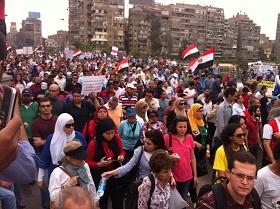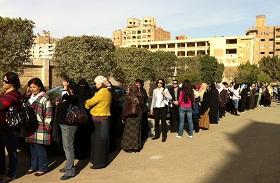Using AI to control energy for indoor agriculture
30 September 2024
Published online 23 October 2012

One of the biggest public demands following the ousting of Egypt's long-time ruler, Hosni Mubarak, was for a new, modern constitution.. But the process of reforming the constitution has been confusing and could amount to one of the greatest mysteries of modern Egypt.
The first official draft is so riddled with contradiction, repetition and nonsense that any analysis leads one to ask what its purpose is. Research and education, the fundamental cornerstones in building any modern and advanced nation, are severely under-represented in direct references and in supporting articles. Their value is much diminished.
All direct references to research and education are relegated to the second chapter of the constitution, "Rights and Duties" and not mentioned in the first chapter "The state and the society". This indicates that the constitution's authors do not consider research and education an integral part of the Egyptian state future.
In addition, articles 9 to 11 establish constitutional precedents and vagueness that can directly hinder equal gender education and research creativity and freedom.
Article 9: The building block of the society is the family and its basics is religion, morals and nationalistic values. The state and society have to protect the family and its true Egyptian identity, unity and stability as well as its traditions and moral values.
This nebulous article is a legal minefield. How will notions such as "family identity", "family stability", and "Egyptian identity" or "moral values" be defined in a multicultural society? Is keeping poor children at school instead of working to provide for the family considered a threat to the family unity and stability? What about female education? Can it be argued, in societies that traditionally saw no reason for female education, that allowing girls basic and higher education is a threat to family traditions?
Article 10: The state and the society are committed to promote and enforce public ethics, morals, and Egyptian traditions. Both the state and the society encourage and enforce higher levels of religious and nationalistic education and morals, scientific facts, Arabic culture, historical and cultural heritage of the nation according to law regulations.
In almost every article, rights are given in the beginning of the article but are then either restricted or reversed afterwards.
Continuing that line of thought, the focus is on indefinable values that have no added value for the future of Egypt nor research and education processes. The article opens more loopholes for the possibility for the suppression of creativity and cultural diversity. Under this wording any attempts to revisit, modernize, enhance or challenge traditions, history or culture can be deemed unconstitutional and thus banned or prosecuted against.
Article 11: The state protects the cultural, civil and linguistic unity of the Egyptian society and promotes the Arabic translation of all sciences and knowledge.
I think this might be one of the most dangerous articles of the whole constitution. At first consideration it will sit well with the layman. It appears to protect the culture and language - but hidden within is the opportunity to ban any foreign language education and cultural exchanges.
This article allows legislators to decide what is culturally appropriate for the whole of Egypt. The legislator could decide to use the "linguistic unity" reference to minimize or ban the teaching of foreign languages such as English. Curtailing the linguistic ability of future researchers to access internationally published research will severely limit Egypt's opportunities to advance.
On the educational front, generations of graduates will lack the capabilities to compete in the regional and international labor market thus damaging the competitiveness of the Egyptian workforce. Foreign investment and the tourism industry will be badly damaged if the workforce in Egypt is not able to professionally communicate.
Contradictions and ambiguity continue in the second chapter of the constitution, "Rights and duties". In almost every article, rights are given in the beginning of the article but are then either restricted or reversed afterwards.
Article 40: Freedom of creativity, in its various forms, is the right of every citizen, and the state [should promote] science and arts, and [will] sponsor creators and inventors, protecting their creations and innovations and working to apply it for the benefit of society. The state shall take necessary measures to maintain the national and cultural legacy with its different diversity, and promote cultural and social services.

The opening statement is strong and clear, but the added "take necessary measures to maintain the national and cultural legacy with its different diversity" clearly nullifies the rights given in the beginning of the article. How is a legislator going to decide what constitutes the national and cultural legacy? It is up to a legislator's own interpretation, taste, political and religious agenda to decide.
What if a study on the physiological and social effect of female genital mutilation is proposed? Will the state sponsor such urgently needed research? Would this article open the possibility of legal challenge to such research on the basis that such practice - which remains widespread in Egypt - is part of the cultural legacy? Would this article even open the way for prosecution of the research team proposing such research?
Article 41: Freedom of access to information, data, statistics, documents and circulations, from whatever source and place, is a right guaranteed to citizens, and the state is committed to enabling them to exercise this right without constraints and disclosure of information - except where in conflict with national security or violation of privacy. The law regulates the access to information and petitions and [should find] appropriate measures against those who deny access.
The vague term national security has often been misused in the past to hinder research. The relevance of this article to matters of education or research might not be clear to some. Cutting-edge scientific research is by nature highly distributed and networked. Scientists in geographically distant locations collaborate on a daily basis. Currently, there are no comprehensive databases of researchers in Egypt and their area of active research. It is thus critical to collect and make available such data on the national level.
I was involved with a project back in 2008 where it was critical to understand the landscape of active research in the area of solar energy in Egypt. We approached the ministry of scientific research at the time and could not find comprehensive and up-to-date data. We then proposed to collect such data using the official ministerial channels and under the oversight of the ministry. Our request was denied on national security grounds. The project of course was relocated to other nations in the region.
Many legislative loopholes throughout the draft, if exploited, would result in the halting of scientific research in Egypt.
Another project of which I was personally aware aimed to find comprehensive data on water content and pollution in Egypt's Western Desert. Data was needed for researchers to develop a management strategy for resources, but access was denied on the grounds of national security.
To ensure the effective development of the Egyptian education system, a complete map of resources, industries and challenges must be drawn and a plan formed responding to needs. The perceived grounds of national security would prevent such a map from being drawn, hindering engagement from civil society, private, and philanthropists in developing the poor Egyptian education system. The national security card could be played to keep the entire education system completely under the control of the state and those in power to direct it according to their own agenda, denying the society any chance of monitoring this critical sector. It is even clearly stated in Article 50 that "the state oversees all types of education, and all education institutes whether public, civil or private is obliged to the state educational plan and goals" .
Finally Article 51: Freedom of scientific research is guaranteed, and the state allocates a sufficient proportion of GNP, according to the international standards, and to ensure the independence of universities and scientific research centers and development.
It must be acknowledged that this article is a considerable development over what existed in the previous constitution. At least scientific research and higher education are mentioned in a separate article. Yet it did not meet the expectations of researchers. In numerous articles, the constitutional committee has indicated expected timelines. One would have expected to find a specific percentage for funding scientific research, or at least a time frame to reach such percentage. The use of "ensure the independence of universities …" is weak. One would have hoped for "Universities and scientific research centers are independent organizations …." Similar to what was used with Al Azhar– the religious reference – in the first chapter.
Article 53 focuses on eradicating illiteracy for both genders and that all resources must be dedicated to achieving this goal within 10 years of this constitution coming into effect. This article is clearly a great addition to the constitution.
Overall, it appears that the constitutional committee is preoccupied with enforcing and protecting specific cultural, linguistic, and religious agendas rather than actually identifying the building blocks of the Egyptian future. Articles directly or indirectly affecting scientific research and education are scattered across the first two chapters and in reality do not in any way enhance or promote scientific research and development or education.
Many legislative loopholes throughout the draft, if exploited, would result in the halting of scientific research in Egypt and cause significant damage to the already weak education system. It is my conviction that the constitution as it stands is not fit for the vision of a developed Egypt and must be significantly modified or rejected in the public referendum.
doi:10.1038/nmiddleeast.2012.151
Stay connected: